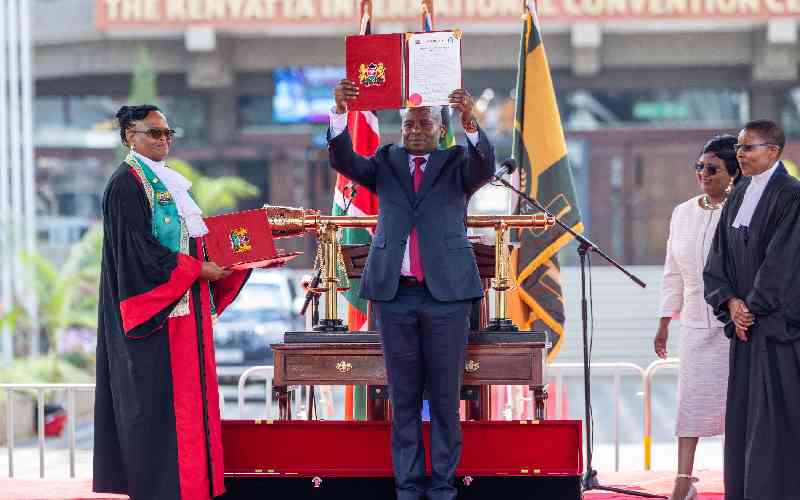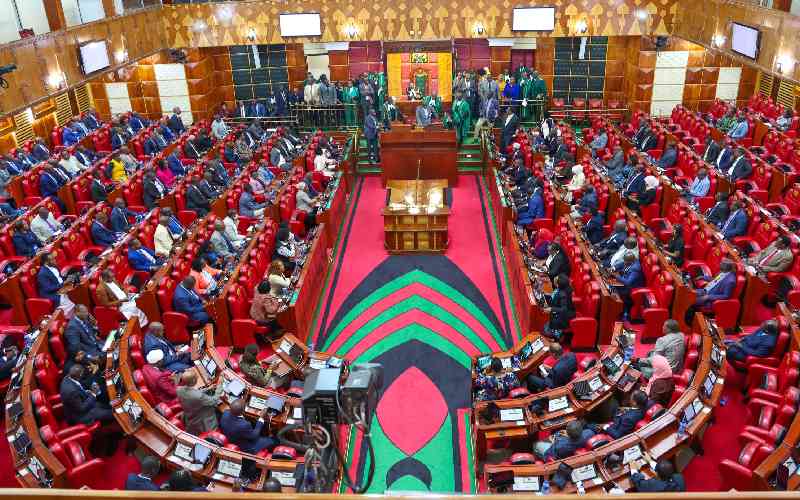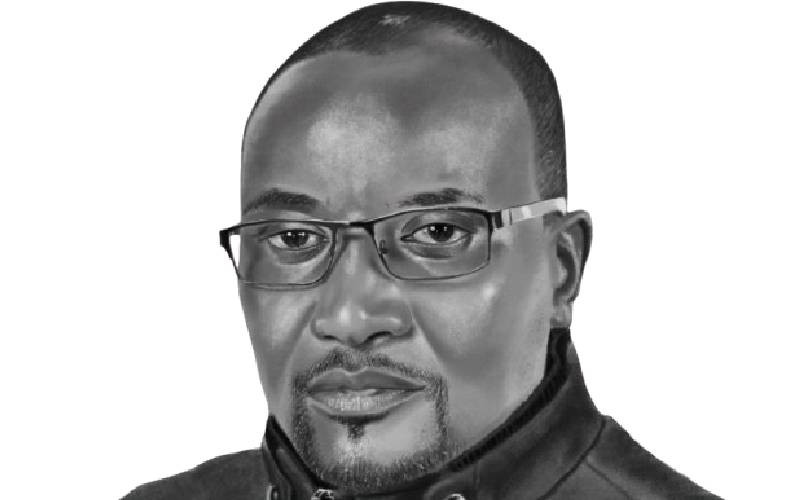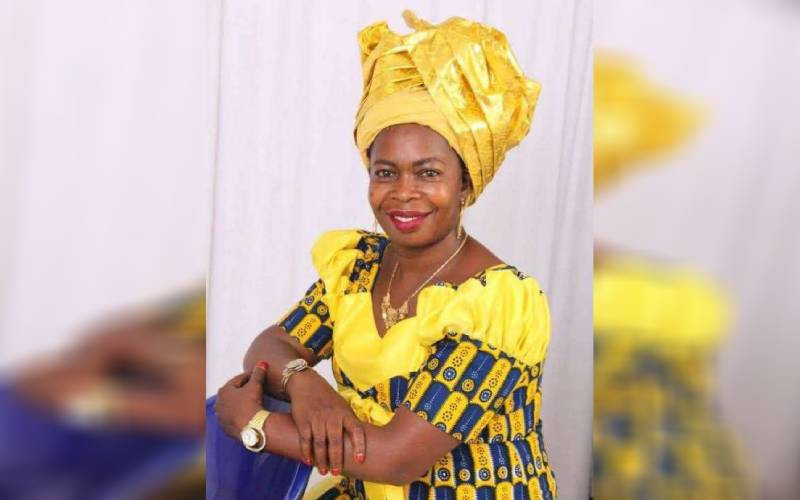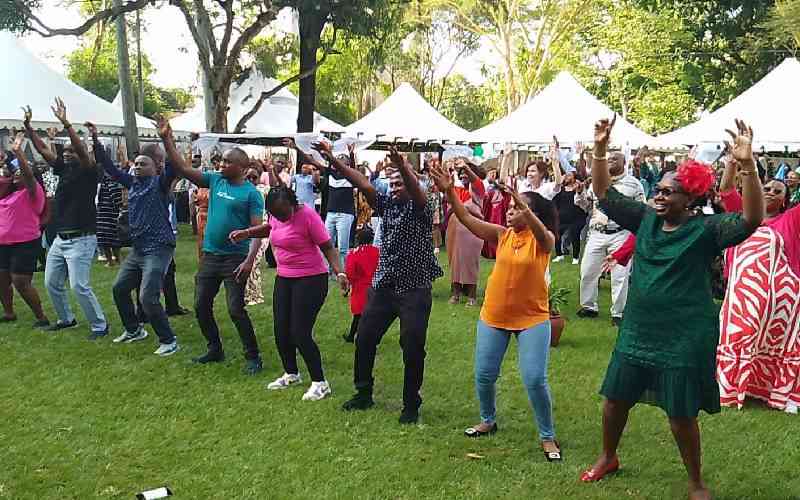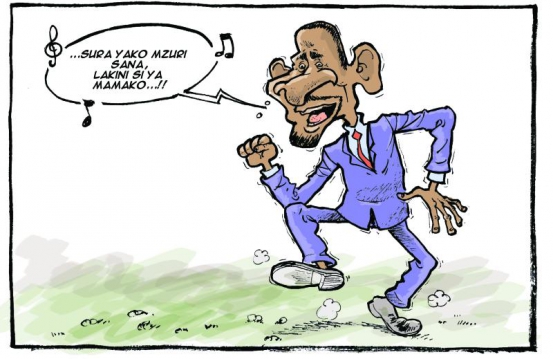
NAIROBI: “Sura yako mzuri mama aah, lakini si ya mama yako ooh,” sang the lanky man we came upon on the main village thoroughfare one sunny Saturday morning. He was totally tone deaf, and the only thing worse than his singing, was his dancing. He had no sense of rhythm; his dance moves resembled a scarecrow caught in a blast of wind. He seemed, however, to be under the illusion that he was a gifted singer and dancer, for his singing and dancing became more animated when we stopped to watch. Our singer-cum-dancer, it soon emerged, was also a poor athlete. As he tried to execute a move, one of his legs tripped on the other and he tumbled to an untidy and very embarrassed heap on the ground.
“Excuse me gentlemen,” he said, as he dusted his clothes, “as Paul Ngei used to say, to trip is not to fall.” He seemed to have hurt himself, for he winced as he spoke, but he was determined to hide the fact. He then told us his name was Agen Kuale, a parliamentary leader from Kenya, and he wanted to take advantage of the quiet and tranquility in our village to begin writing a book he called ‘ Si ya mama yako system of thought’. “This work, my friends,” he announced, “will transform Kenya and Africa.
We were amazed to learn who he was, for his reputation as a belligerent lawmaker had long preceded him. We had heard about his fierce loyalty to the government, his irrational outbursts and ridiculous claims, his egoistic posturing, and above all, his disdain for any argument, however rational, which went against the government’s position. Eager to learn more about him and his philosophy, we accompanied Agen to Old Nyati’s house, where all foreign visitors were officially received.
“We work so hard,” Agen complained to Old Nyati, “and yet the people call us ‘Mpigs’.” He affected the face of a long-suffering man and declared solemnly, “But we will carry on diligently... our conscience demands no less.” As I watched his performance, I could not help thinking, “Lord, this man is an actor too.” I remembered another Kenyan politician-cum-actor – the man who had an expression to fit every occasion, Kanzolo Mukyosa.
Whatever could be said of Agen, not being energetic was not one of them. He would wake up early for a long walk in the plains. Then he would sit under the tree in his yard and scribble for hours in a notebook. After a heavy lunch, chased down with several litres of cuddled camel milk, a heavy affair given his spare build, he would recline in the hammock for a while, after which he would sing his favourite song while dancing vigorously, if haphazardly.
Once, while I was walking by his compound, Agen called out to me: “Hey, come join me...in Africa, dancing is a communal activity.” I felt a little silly singing and dancing to the ridiculous song. What was worse, Agen, because he totally believed he was a dancing master, insisted that I imitate his moves. I was relieved when, finally out of breath, he stopped. We sat on the bench on his veranda.
“You see,” he said, when he had recovered sufficiently to attempt speech, “Si ya mama yako philosophy can cure all our ills in Kenya...basically, it works like this: if you see someone engaged in bad behaviour, you scream, ‘Si ya mama yako!’”
He saw the confused look on my face. “The reference to one’s mother,” Agen explained excitedly, “causes the wrongdoer to recall the pure love of his mother, and when he sees his misdeed against this love, its impurity becomes painfully obvious to him.” We discussed other subjects. Agen had someone or something to blame for all the problems. He blamed terrorists and their sympathisers for terrorism. “I will soon expose the sympathisers,” he declared solemnly. He blamed people he called “lords of poverty” for poverty, and blamed greed for strife in education. “ They want perks like ours,” he sniffed.
Later, I asked Agen about his intention to jump from buildings to please his leaders. “Is that not like the politician who offered his life to the president during the Nyayo days,” I asked him. “My jumping,” said Agen in earnest, “is really to prepare myself for the Olympics should jumping from buildings be introduced in the games. I then asked him about Kenya’s future. “Kenyan politicians’ future,” said Agen, without any sense of irony “is very bright.”
 The Standard Group Plc is a
multi-media organization with investments in media platforms spanning newspaper
print operations, television, radio broadcasting, digital and online services. The
Standard Group is recognized as a leading multi-media house in Kenya with a key
influence in matters of national and international interest.
The Standard Group Plc is a
multi-media organization with investments in media platforms spanning newspaper
print operations, television, radio broadcasting, digital and online services. The
Standard Group is recognized as a leading multi-media house in Kenya with a key
influence in matters of national and international interest.
 The Standard Group Plc is a
multi-media organization with investments in media platforms spanning newspaper
print operations, television, radio broadcasting, digital and online services. The
Standard Group is recognized as a leading multi-media house in Kenya with a key
influence in matters of national and international interest.
The Standard Group Plc is a
multi-media organization with investments in media platforms spanning newspaper
print operations, television, radio broadcasting, digital and online services. The
Standard Group is recognized as a leading multi-media house in Kenya with a key
influence in matters of national and international interest.


